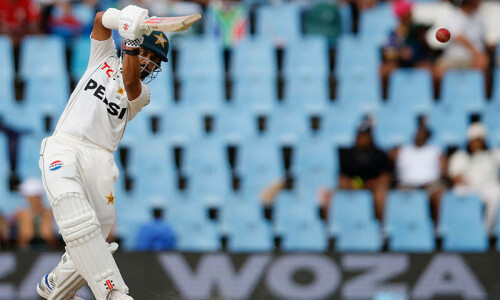Those who did show up made for a rather interesting mix of audience: established arts-focused families (practitioners, dilettantes, wealthy indulgers, etc.), microphone lovers who hijacked question and answer sessions, uniformed schoolchildren with their smartphones out and swiping away, book lovers, film enthusiasts, cynics with their angled approach to everything, bewildered families flitting in and out of sessions, romantically inclined girls who came to see Bilal Lashari, similarly inclined men who came to see Faryal Gauhar, and the omnipresent press photographers who got in everybody’s face to make a portrait shot.
A few good sessions rewarded their keenness. Mohsin Hamid was there, and he spoke in the same vein as he did at the February festival, though the talk was guided by moderator Mira Sethi to a more politically charged discussion on Pakistan’s security status. Hamid shared his rather optimistic outlook, and it may have come across as naïve to many in the audience who are examining the same situation with less positive imagination. Hamid’s optimism was challenged by travel writers and enthusiasts on another panel, this one on “wanderings through Pakistan”. Veteran travel writers Salman Rashid and Tahir Jahangir, and video artist and traveller Wajahat Malik, all shared their despondency on the state’s lack of security with the audience. “Don’t go to Balochistan or Khyber Pakhtunkhwa,” was their unequivocal message. They managed to temper the panic a bit by saying they hoped the situation would improve, but moderator Masud Hassan reiterated the fact that Pakistan’s age-old story was continuing to play out: so much potential, untapped and seemingly impossible to tap.
Highlights at the festival also included an engaging lesson on Pakistani and subcontinental classical music by the legendary Farida Khanum, and the equally statured Ghulam Ali. The ghazal singers explained how Raag Aiman and Bhairvi were so comprehensive that their note progression could possibly incorporate all music compositions. It seemed hyperbolic, but the audience was inclined to agree, in deference to the maestros.
The only debate of true interest in the otherwise placid art festival ran thus: why have people stopped reading, and how do we get them back on the books? Appropriately enough, the discussion was started among panelists from various publishing houses, and right at the start of the two-day event. They blamed the readers and the young for having turned away from books toward gadgets and voiced the need to make reading appear “cool”. While this may make sense in a society strung out on marketing, and for bookmakers focusing on the numbers they have to address, the panelists failed to see it from the readers’ side.
They did not grasp that reading is not cool. It is for the most part a solitary act, and a reflective one. What scares readers away from books is not boredom, but distraction through shallow entertainment provided by constantly changing visual and tactile media. Insight and reflection have no chance to compete, and books should not be made shallower in order to be in direct competition. In fact, the idea of “cool” needs moderation rather than having books incorporated within it. Moreover, the panel shared quite startling information with the audience: there is no proper channel for getting published in Pakistan — no literary agents, no query letters. The infrastructure and professionalism is wanting at best, and up for grabs for book-loving entrepreneurs.
The arts and literature festival began with a soothing Mekaal Hassan-led folk-ensemble rendition of the national anthem, and lived up to some of its promise, for the few who came. This event is a first for these four women of the Khayaal Network, and it’s a good start, but that’s all it is. A literary and arts festival demands improvement, and it demands engagement with the city, if it is to focus on a particular city. Next time, hopefully, there will be better publicity, more attendance, and deeper conversations.
The writer teaches rhetoric at the Lahore University of Management Sciences
















































Dear visitor, the comments section is undergoing an overhaul and will return soon.